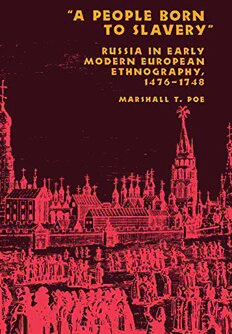
A People Born to Slavery: Russia in Early Modern European Ethnography, 1476-1748 PDF
Preview A People Born to Slavery: Russia in Early Modern European Ethnography, 1476-1748
00-C1217-FM 11/17/00 12:01 PM Page i " A People Born to Slavery" 00-C1217-FM 11/17/00 12:01 PM Page ii studies of the harriman institute Columbia University The Harriman Institute, Columbia University, sponsors the Studies of the Harriman Institute in the belief that their publication contributes to scholarly research and public understanding. In this way, the Institute, while not neces- sarily endorsing their conclusions, is pleased to make available the results of some of the research conducted under its auspices. 00-C1217-FM 11/17/00 12:01 PM Page iii " A People B orn to Slavery" russia in early modern european ethnography, 1476–1748 Marshall T. Poe (cid:2) cornell university press ithaca and london 00-C1217-FM 11/17/00 12:01 PM Page iv Copyright © 2000 by Cornell University All rights reserved. Except for brief quotations in a review, this book, or parts thereof, must not be reproduced in any form without permission in writing from the publisher. For information, address Cornell University Press, Sage House, 512 East State Street, Ithaca, New York 14850. First published 2000 by Cornell University Press Printed in the United States of America Library of Congress Cataloging-in-Publication Data Poe, Marshall. A people born to slavery : Russia in early modern European ethnography, 1476–1748 / Marshall T. Poe p. cm. Includes bibliographical references and index. isbn0-8014-3798-9 (alk. paper) 1. Russia—Foreign public opinion, European. 2. Public opinion—Europe. 3. Russia—Relations—Europe. 4. Europe—Relations—Russia. I. Title. d34.r9 p64 2000 947—dc21 00-010045 Cornell University Press strives to use environmentally responsible suppliers and mate- rials to the fullest extent possible in the publishing of its books. Such materials include vegetable-based, low-VOC inks and acid-free papers that are recycled, chlorine-free, or partly composed of nonwood fibers. Books that bear the logo of the FSC (Forest Stew- ardship Council) use paper taken from forests that have been inspected and certified as meeting the highest standards for environmental and social responsibility. For further information, visit our website at www.cornellpress.cornell.edu. Cloth printing 10 9 8 7 6 5 4 3 2 1 00-C1217-FM 11/17/00 12:01 PM Page v boris: But I would say instead, “Whoever barks is a dog.” Our neighbors show their envy when they malign us, and we should therefore ignore them. Those who despise should be despised. Whoever thinks I am a barbarian, I consider him a barbarian. khrevoi: Brother, you are mistaken. It is easier to say than to do, for who- ever ignores the view of the outside world knows neither shame nor honor. He is like some ancient fool who considers himself a philosopher, but who is merely a cynic. Iurii Krizhanich, 1663–66 00-C1217-FM 11/17/00 12:01 PM Page vi 00-C1217-FM 11/17/00 12:01 PM Page vii Contents Acknowledgments ix A Note on Abbreviations xi Introduction The History of “Russian Tyranny” 1 chapter 1 Terra Incognita The Earliest European Descriptions of Muscovy 11 chapter 2 Legatus ad Moscoviam European Ambassadors and the Origin of “Russian Tyranny” 39 chapter 3 Necessarium Malum European Residents and the Origin of “Russian Tyranny” 82 vii 00-C1217-FM 11/17/00 12:01 PM Page viii viii Contents chapter 4 Rerum Moscoviticarum Herberstein and the Origin of “Russian Tyranny” 117 chapter 5 Tyrannis sine Tyranno Political Categories and the Origin of “Russian Tyranny” 145 chapter 6 Simplex Dominatus Russian Government in European Political Science 168 chapter 7 Was Muscovy a Despotism? 196 Appendix Folkloric Stories about Ivan IV in European Ethnographies, 1555–1700 227 Bibliographies 1. Primary Sources: Foreign Accounts of Russia, 1476–1700 239 2. Other Primary Sources 251 3. Secondary Sources 255 4. Secondary Sources on European Authors 265 Index 283 00-C1217-FM 11/17/00 12:01 PM Page ix Acknowledgments no endeavor of this magnitude is completed without support from many quarters. I received much aid from my mentors. Many years ago, I had the good fortune to be assigned Daniel Kaiser as my freshman tutor at Grin- nell College. He introduced me to both the historian’s craft and the study of Muscovy. I am accordingly in his debt. Work on this book began at the Uni- versity of California, Berkeley. So it is only appropriate that I express my heartfelt appreciation to my graduate adviser, Nicholas Riasanovsky. I also thankReginaldZelnik(UniversityofCalifornia,Berkeley)andRobertCrum- mey (University of California, Davis) for advice in my graduate school years and thereafter. I am particularly grateful to Nancy Shields Kollmann (Stan- ford) for posing a question that prompted me to rethink and ultimately to completelyrevisewhatIhadwritten.Coulditbethecase,sheasked,thatthe seemingly improbable things the Europeans said about the Muscovites were true? I hope I have answered that question in this book. Finally, I would like to thank Edward Keenan (Harvard), who offered advice and aid at every mo- ment in the evolution of this project. Many institutions supported my work on this book, and I am indebted to them all: the University of California at Berkeley, Harvard University, the Social Science Research Council, the International Research and Exchange Board, the National Council for Soviet and Eastern European Research, the Kennan Institute for Russian Studies, the Harriman Institute for Russian Studies (Columbia University), and the Institute for Advanced Study. Many other colleagues and friends generously provided aid and com- fort over the years. They all have my thanks. The contribution of Mihi Carol Namkoong was immeasurable. This book is dedicated to her. M. P. ix 00-C1217-FM 11/17/00 12:01 PM Page x
